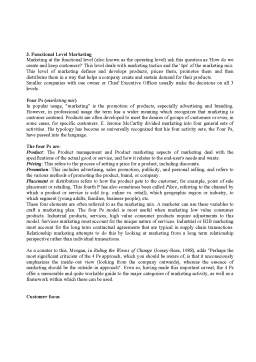Extras din referat
Marketing is a social and managerial function that attempts to create, expand and maintain a collection of customers. It attempts to deliver demand satisfying output through profitable exchanges.
Marketing, as suggested by the American Marketing Association, is "an organizational function and a set of processes for creating, communicating and delivering value to customers and for managing customer relationships in ways that benefit the organization and its stakeholders".
Philip Kotler, in his earlier books, defines marketing as: "human activity directed at satisfying needs and wants through exchange processes". Still another marketing definition, coined by Brian Norris: "The process of repeatedly moving people closer to making a decision to purchase, use, follow, refer, upload, download, obey, reject, conform, become complacent to another person's, society's or organization's value. Simply, if it doesn't facilitate a "sale" then it's not marketing."
Add to Kotler's and Norris' definitions, a response from the Chartered Institute of Marketing (CIM). The association's definition claims marketing to be the "management process of anticipating, identifying and satisfying customer requirements profitably". Thus, operative marketing involves the processes of market research, new product development, product life cycle management, pricing, channel management as well as promotion.
Marketing -"taking actions to define, create, grow, develop, maintain, defend and own markets".
An approach to business that seeks to identify, anticipate and satisfy customers needs.
Al Ries and Jack Trout defined marketing as simply "war" between competitors.
Any activity that connects producers with consumers.
At a macro level, marketing is the process of raising the standards of living, by identifying the existing problems and unsatisfied needs of people and then satisfying that need with a product/service that delivers value to the customer.
The practice of marketing is almost as old as humanity itself. Whenever a person has an item or is capable of performing a service, and he or she seeks another person who might want that item or service, that person is involved in marketing. A Market was originally simply a gathering place where people with a supply of items or capacity to perform a service could meet with those who might desire the items or services, perhaps at a pre-arranged time.
Such meetings embodied all the aspects of today's marketing methods, although in an informal way. Sellers and buyers sought to understand each other's needs, capacities, and psychology, all with the goal of getting the exchange of items or services to take place. Open air markets throughout the world, with buyers and sellers freely mingling, are today's example of this basic activity. Today's New York Stock Exchange had its humble beginnings as an open air market located at Wall Street in New York City.
The rise of Agriculture undoubtedly influenced markets as the earliest means of 'mass production' of an item, namely foodstuffs. As agriculture allowed one to grow more food than could be eaten by the grower alone, and most food is perishable, there was likely motivation to seek out others who could use the excess food, before it spoiled, in exchange for other items.
Prior to the advent of market research, most companies were product-focused, employing teams of salespeople to push their products into or onto the market, regardless of market desire. A market-focused, or customer-focused, organization instead first determines what its potential customer’s desire, and then builds the product or service. Marketing theory and practice is justified on the belief that customers use a product/service because they have a need, or because a product/service has a perceived benefit.
Two major factors of marketing are the recruitment of new customers (acquisition) and the retention and expansion of relationships with existing customers (base management).
Once a marketer has converted the prospective buyer, base management marketing takes over. The process for base management shifts the marketer to building a relationship, nurturing the links, enhancing the benefits that sold the buyer in the first place, and improving the product/service continuously to protect her business from competitive encroachments.
Marketing methods are informed by many of the social sciences, particularly psychology, sociology, and economics. Anthropology is also a small, but growing, influence. Market research underpins these activities. Through advertising, it is also related to many of the creative arts.
For a marketing plan to be successful, the mix of the four "Ps" must reflect the wants and desires of the consumers in the target market. Trying to convince a market segment to buy something they don't want is extremely expensive and seldom successful. Marketers depend on marketing research, both formal and informal, to determine what consumers want and what they are willing to pay for. Marketers hope that this process will give them a sustainable competitive advantage. Marketing management is the practical application of this process. The offer is also an important addition to the 4P's theory.
Is Marketing an Art or Science?
The big debate in the marketing discipline is whether marketing is an art or a science. Marketing is a technology or set of technologies. Marketing can be neither an art nor a science because arts and sciences only seek to explain natural phenomena. The objective of marketing is to manipulate and influence natural phenomena to create practical unnatural outcomes. Specifically to manufacture, grow, sustain and defend markets. Marketers use their knowledge of economics, psychology, sociology, anthropology and strategy to arrange and control the external environment to their advantage.
To understand what marketing is one must understand that marketing operates on 3 different levels.
1. Corporate Level Marketing
Marketing at the corporate levels asks this question as 'What business should we be in and what opportunities should we pursue?' This is marketing before we even have a business, idea or product. This is what is known as entrepreneurship. This level is also where corporate management of existing companies decides to branch off into new uncharted territories and opportunities.
Preview document
Conținut arhivă zip
- Marketing Essay.doc














